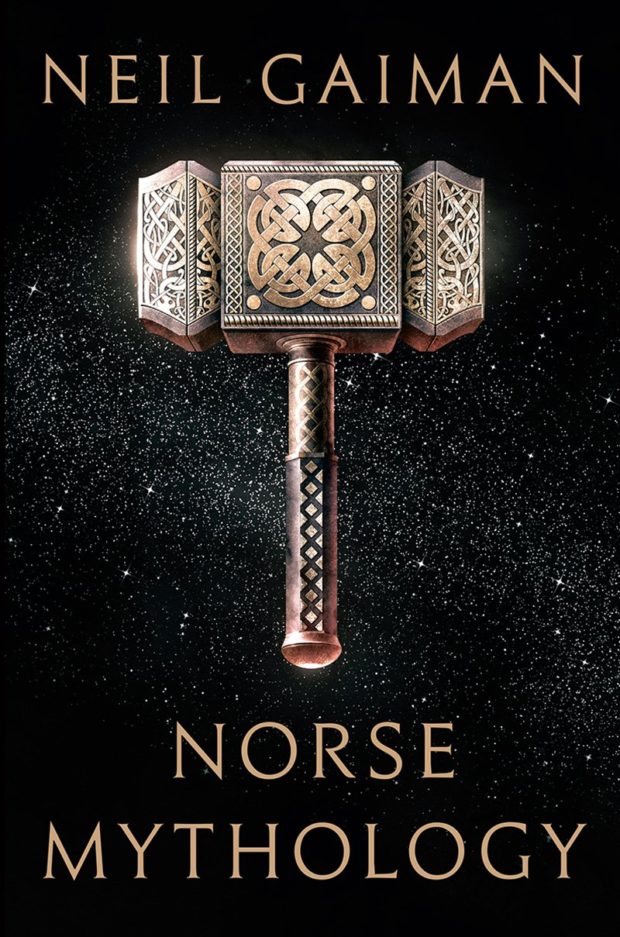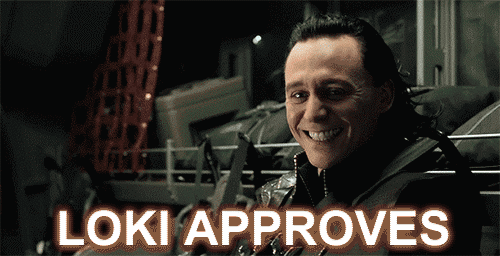
Although I’m an unabashed fan of genre entertainment (and a fellow fantasy writer), I’ve had little exposure to the work of award winning scribe, Neil Gaiman. I knew of his talent through film adaptations and the comic Lucifer that spun off from his seminal creation, The Sandman. Gaiman’s latest novel, Norse Mythology, was the perfect opportunity for me to experience one of the most heralded fiction writers of our time. The book wasn’t what I expected––in a good way––but it’s a passionate accomplishment that harkens back to an older age of storytelling.
“I hope I’ve retold these stories honestly, but there was still joy and creation in the telling.”
A candid introduction explores Gaiman’s passion for the Nordic pantheon and his influences in the field of mythology. It’s an important peek behind the curtain that establishes his tone and intentions for the project. Though many of the stories and characters are well known, Norse Mythology is wholly Gaiman’s vision. He then sets the stage with succinct biographies on Odin, Thor, and Loki––the major players around which most of the tales revolve––before detailing the Norse origin myth. The plethora of names and events is a bit dry but necessary so that the reader can dive into the characters with a basic understanding of their history. Thankfully, there is a glossary at the back.
“Before the beginning there was nothing––no earth, no heavens, no stars, no sky: only the mist world, formless and shapeless, and the fire world, always burning.”
Once the proper stories began, I was hooked. I expected a hyper-detailed prose akin to The Lord of the Rings and was quite surprised by Gaiman’s economy. The book reads more like spoken stories or parables put to page, as if Gaiman is regaling you by the campfire. Excessive, flowery language is eschewed in favor of a flowing, matter-of-fact pace rich with humor and wit. Gaiman chooses his details with confidence, servicing the narrative while ensuring no literary fat. He doesn’t spend pages describing every societal facet of Asgard, and yet the picture he paints is no less evocative. Moments of anachronistic dialogue help ground the stories and make the gods feel more modern. One of my favorite lines comes in Loki’s response as to why he chopped off Sif’s hair:
“It was funny. I was drunk.”

Gaiman takes the reader on all manner of godly adventures, but I found “Freya’s Unusual Wedding” to be particularly memorable. Thrym, lord of the ogres, has stolen Thor’s hammer and will only return it for Freya’s hand in marriage. Of course, Freya wants no part of the shenanigans (“Shut up, Thor”), so Loki devises a brilliant plan: Thor will dress up as Thrym’s bride-to-be in order to reclaim Mjollnir. Hilarity, feasting, and violence ensues.
“Why are Freya’s eyes so…so terrifying?” asked Thrym. “It seemed as if there was a fire burning inside them. Those weren’t the eyes of a beautiful woman!”
“Of course not,” said the maiden who was Loki smoothly. “You wouldn’t expect them to be. She hasn’t slept for eight days and eight nights, mighty Thrym. She was so consumed by love for you that she dared not sleep, she was so mad to taste your love. She’s burning up inside for you! That’s what you’re seeing in those eyes. Burning passion.”
“The Mead of Poets” is another story that stuck with me, particularly in how it explains the existence of bad poetry:
“No one, then or now, wanted to drink the mead that came out of Odin’s ass. But whenever you hear bad poets declaiming their bad poetry, filled with foolish similes and ugly rhymes, you will know which of the meads they have tasted.”
These smaller-scale stories reveal more of the gods’ personalities, and by extension, of Gaiman himself. Throughout Norse Mythology, it’s apparent that these are not the Norse gods popularized by Marvel. They can be petty, selfish, competitive, downright stupid, and quick to kill or condemn family. In that respect, there’s an Old Testament feel to it, which makes Gaiman’s humor all the more welcome.

While the assemblage of tales may seem random, there is an overarching story that concludes in “Ragnarok: The Final Destiny of the Gods.” You’d think that ending the novel with an apocalypse would be a downer, but the themes come full circle for a satisfying closure to one of the best (and most entertaining) collections of Norse mythology available.
“That is the end. But there is also what will come after the end.”
Norse Mythology is a triumph. Gaiman wanted to tell these stories in his own way, with his own passion, and then let them become something else for the reader. Something personal. With Norse Mythology, Gaiman is encouraging readers to pass along these tales––to keep myth alive––and he succeeds on every level.
Whether you’re a die-hard Gaiman fan, a mythology buff, or simply love solid fiction, Norse Mythology is a must-read.
This seems like it would be a perfect companion read to Fall From Grace: a contemporary, deep-dive retelling of some of the most revered gods of world mythology — a peek behind the curtain at their petty rivalries and insecurities! Can’t wait to check it out for myself!
As I mentioned in the review, I was very surprised with the style of prose. It truly feels more like verbal storytelling. I can’t imagine a more accessible collection of Norse myths.